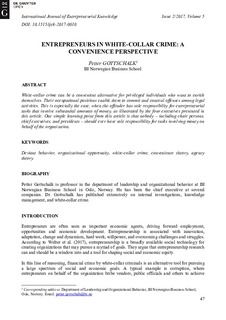| dc.contributor.author | Gottschalk, Petter | |
| dc.date.accessioned | 2018-02-27T13:22:29Z | |
| dc.date.available | 2018-02-27T13:22:29Z | |
| dc.date.created | 2018-01-19T07:46:00Z | |
| dc.date.issued | 2017 | |
| dc.identifier.citation | International Journal of Entrepreneurial Knowledge. 2017, 5 (2), 47-55. | nb_NO |
| dc.identifier.issn | 2336-2952 | |
| dc.identifier.uri | http://hdl.handle.net/11250/2487403 | |
| dc.description.abstract | White-collar crime can be a convenient alternative for privileged individuals who want to enrich themselves. Their occupational positions enable them to commit and conceal offenses among legal activities. This is especially the case, when the offender has sole responsibility for entrepreneurial tasks that involve substantial amounts of money, as illustrated by the four executives presented in this article. One simple learning point from this article is that nobody – including chair persons, chief executives, and presidents – should ever have sole responsibility for tasks involving money on behalf of the organization. | nb_NO |
| dc.language.iso | eng | nb_NO |
| dc.publisher | De Gruyter | nb_NO |
| dc.relation.uri | http://ijek.org/files/IJEK_2-2017v5/IJEK-2-2017,v.5_gottschalk,p..pdf | |
| dc.title | Entrepreneurs in white-collar crime: A convenience perspective | nb_NO |
| dc.type | Journal article | nb_NO |
| dc.type | Peer reviewed | nb_NO |
| dc.description.version | publishedVersion | nb_NO |
| dc.source.pagenumber | 47-55 | nb_NO |
| dc.source.volume | 5 | nb_NO |
| dc.source.journal | International Journal of Entrepreneurial Knowledge | nb_NO |
| dc.source.issue | 2 | nb_NO |
| dc.identifier.doi | 10.1515/ijek-2017-0010 | |
| dc.identifier.cristin | 1546966 | |
| dc.description.localcode | 1, OA | nb_NO |
| cristin.unitcode | 158,4,0,0 | |
| cristin.unitname | Institutt for ledelse og organisasjon | |
| cristin.ispublished | true | |
| cristin.fulltext | original | |
| cristin.qualitycode | 1 | |
